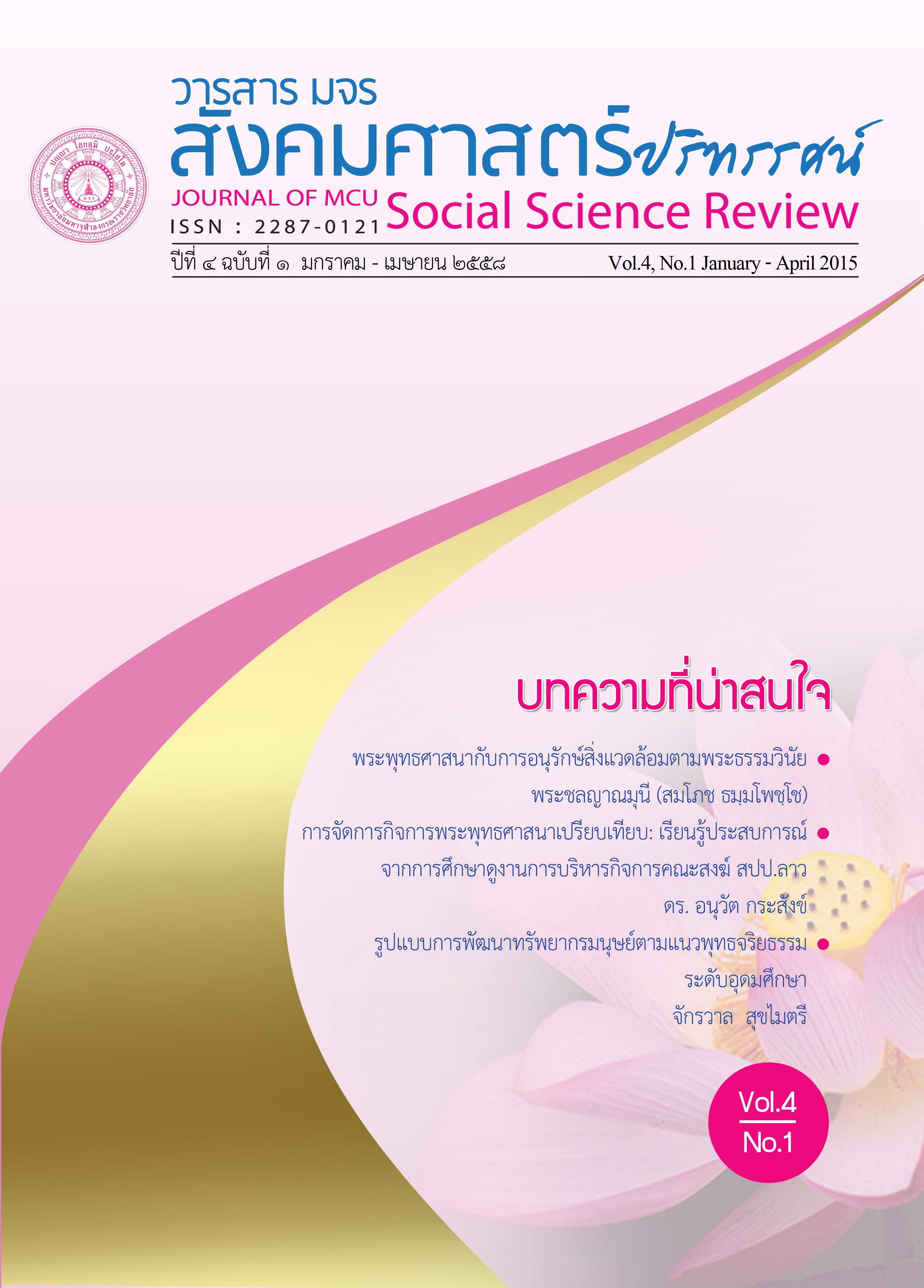พระพุทธศาสนากับการอนุรักษ์สิ่งแวดล้อมตามพระธรรมวินัย
คำสำคัญ:
พระพุทธศาสนา, การอนุรักษ์สิ่งแวดล้อม, พระธรรมวินัยบทคัดย่อ
พระพุทธศาสนามีบทบาทสําคัญในการอนุรักษ์และถนอมธรรมชาติ ตามพระธรรมวินัย เป็นกฎระเบียบที่พระพุทธเจ้าทรงบัญญัติขึ้น เพื่อใช้ปกครองคณะสงฆ์ให้เป็นสังคมตัวอย่างที่ดีแก่ ประชาชนในการดําเนินชีวิตที่เรียบง่ายให้สอดคล้องสัมพันธ์กับกฎของธรรมชาติและสภาพแวดล้อม เป็นการอนุรักษ์ทรัพยากรธรรมชาติและสิ่งแวดล้อมไปด้วย ทั้งปฏิบัติตนให้บรรลุคุณธรรมด้วย จึงได้ ประโยชน์ทั้งสองทาง คือประโยชน์ของพระวินัยต่อทรัพยากรธรรมชาติและสิ่งแวดล้อมและ ประโยชน์ต่อสังคม เมื่อพระสงฆ์ปฏิบัติดีปฏิบัติชอบตามพระธรรมวินัยแล้วย่อมทําให้สังคมนั้นๆ อยู่ อย่างสงบ ไม่เดือนร้อน จึงพอประมวลประโยชน์ของพระวินัยที่มีต่อสังคม ดังนี้ ได้แก่ (๑) ช่วยสร้าง ความมีระเบียบวินัยให้แก่สังคม โดยพระสงฆ์ปฏิบัติเป็นตัวอย่าง (๒) เมื่อภิกษุไม่ตัดไม้ทําลายป่าก็ ส่งผลให้สังคมอยู่อย่างสงบสุข (๓) ทําให้ประชาชนเกิดศรัทธาเลื่อมใสในการประพฤติปฏิบัติของ พระสงฆ์และปฏิบัติตาม จะเห็นได้ว่า ทรัพยากรธรรมชาติและสิ่งแวดล้อมมีความสําคัญต่อชีวิตของ มวลมนุษย์ สัตว์และพืช โดยการไม่ทําลายให้เสียความสมดุลย์ทางระบบนิเวศวิทยา พระสงฆ์เป็น ส่วนหนึ่งของสังคมมนุษย์ และมีพระวินัยเป็นกฎระเบียบในการดําเนินชีวิต พระวินัยที่พระสงฆ์รักษา นี้สอดคล้องกับการอนุรักษ์ธรรมชาติและสิ่งแวดล้อมมากน้อยเพียงใด สามารถประยุกต์ใช้ได้มาก น้อยแค่ไหน การที่พระสงฆ์จะเป็นนักอนุรักษ์ธรรมชาติและสิ่งแวดล้อมผิดพระวินัยหรือไม่ คําตอบนี้ อาจหาได้โดยการเปรียบเทียบสาระสําคัญของทรัพยากรธรรมชาติและสิ่งแวดล้อมกับพระวินัย
เอกสารอ้างอิง
๑. ภาษาไทย
(๑) หนังสือ
ธีระพล อรุณะกสิกรและคณะรวบรวม. พระราชบัญญัติส่งเสริมและรักษาคุณภาพสิ่งแวดล้อม แห่งชาติ พ.ศ. ๒๕๓๕. กรุงเทพมหานคร : สํานักพิมพ์วิญญูชน, ๒๕๔๒.
ประชา หุตานิวัตร. การเมืองสีเขียว. กรุงเทพมหานคร : มูลนิธิเด็ก, ๒๕๒๒.
พระเทพเวที(ประยุทธ์ ปยุตโต) พระกับป่ามีปัญหาอะไร. กรุงเทพมหานคร : เรือนแก้วการพิมพ์, ๒๕๓๔.
พระธรรมปิฎก (ป.อ.ปยุตโต), คนไทยกับป่า. พิมพ์ครั้งที่ ๔. กรุงเทพมหานคร: สํานักพิมพ์มูลนิธิ พุทธธรรม. โรงพิมพ์สหธรรมมิก จํากัด, ๒๕๓๗.
พระธรรมปิฎก (ป.อ.ปยุตฺโต). การพัฒนาที่ยั่งยืน พิมพ์ครั้งที่ 5. กรุงเทพมหานคร: สํานักพิมพ์มูลนิธิโกมลคีมทอง , ๒๕๔๒
พระราชวรมุนี (ประยุทธ์ ปยุตโต), พุทธธรรม. พิมพ์ครั้งที่ ๒. กรุงเทพมหานคร : มหาจุฬาลงกรณ ราชวิทยาลัย. ๒๕๒๔.
พระมหาจรรยา สุทธิญาโณ, พุทธศาสนากับสิ่งแวดล้อม, กรุงเทพมหานคร: อักษรเจริญการพิมพ์, ๒๕๓๖.
ภัทรพร สิริกาญจน, หน้าที่ของพระสงฆ์ตามพุทธบัญญัติ, แนวคิดและบทบาทของพระคําเขียน สุวณโณ ในการพัฒนาชุมชน, งานวิจัยเสนอต่อสถาบันไทย คดี ศึกษา มหาวิทยาลัยธรรมศาสตร์, กุมภาพันธ์ ๒๕๓๘.
มหาจุฬาลงกรณราชวิทยาลัย, พระไตรปิฎกภาษาบาลี, ฉบับมหาจุฬาเตปิฏก์ ๒๕๐๐. กรุงเทพมหานคร : โรงพิมพ์มหาจุฬาลงกรณราชวิทยาลัย, ๒๕๓๕.
มหาจุฬาลงกรณราชวิทยาลัย. พระไตรปิฎกภาษาไทย. ฉบับมหาจุฬาลงกรณราชวิทยาลัย. กรุงเทพมหานคร : โรงพิมพ์ มหาจุฬาลงกรณราชวิทยาลัย, ๒๕๓๔.
มหาจุฬาลงกรณราชวิทยาลัย. อรรถกถาภาษาบาลี ฉบับมหาจุฬาลงกรณราชวิทยาลัย, กรุงเทพมหานคร :โรงพิมพ์ มหาจุฬาลงกรณราชวิทยาลัย, โรงพิมพ์วิญญาณ, ๒๕๓๒.
(๒) วารสาร
พระธรรมโกศาจารย์ (พุทธทาส อินทปญโญ), พระสงฆ์กับการอนุรักษ์ป่า, ในนิตยสารเสขิยธรรม ปีที่ ๒ ฉบับที่ ๔ มกราคม กุมภาพันธ์ ๒๕๓๕.
๒. ภาษาอังกฤษ
(1) Book
Norman, K.R. (Tr.), Theragatha, London: Pali Text Society. 1969.
UNEP, World soil polic, United Nations Envir, Programme. Nairabi. Kenya, 1982.
Wickkremesinghe, K.D.P, The Biography of the Buddha. Columbo: J.W.Mawata, 1972
ดาวน์โหลด
เผยแพร่แล้ว
รูปแบบการอ้างอิง
ฉบับ
ประเภทบทความ
สัญญาอนุญาต
ลิขสิทธิ์ (c) 2018 วารสาร มจร สังคมศาสตร์ปริทรรศน์

อนุญาตภายใต้เงื่อนไข Creative Commons Attribution-NonCommercial-NoDerivatives 4.0 International License.
เพื่อให้เป็นไปตามกฎหมายลิขสิทธิ์ ผู้นิพนธ์ทุกท่านต้องลงลายมือชื่อในแบบฟอร์มใบมอบลิขสิทธิ์บทความให้แก่วารสารฯ พร้อมกับบทความต้นฉบับที่ได้แก้ไขครั้งสุดท้าย นอกจากนี้ ผู้นิพนธ์ทุกท่านต้องยืนยันว่าบทความต้นฉบับที่ส่งมาตีพิมพ์นั้น ได้ส่งมาตีพิมพ์เฉพาะในวารสาร มจร สังคมศาสตร์ปริทรรศน์ เพียงแห่งเดียวเท่านั้น หากมีการใช้ภาพหรือตารางหรือเนื้อหาอื่นๆ ของผู้นิพนธ์อื่นที่ปรากฏในสิ่งตีพิมพ์อื่นมาแล้ว ผู้นิพนธ์ต้องขออนุญาตเจ้าของลิขสิทธิ์ก่อน พร้อมทั้งแสดงหนังสือที่ได้รับการยินยอมต่อบรรณาธิการ ก่อนที่บทความจะได้รับการตีพิมพ์ หากไม่เป็นไปตามข้อกำหนดเบื้องต้น ทางวารสารจะถอดบทความของท่านออกโดยไม่มีข้อยกเว้นใดๆ ทั้งสิ้น





